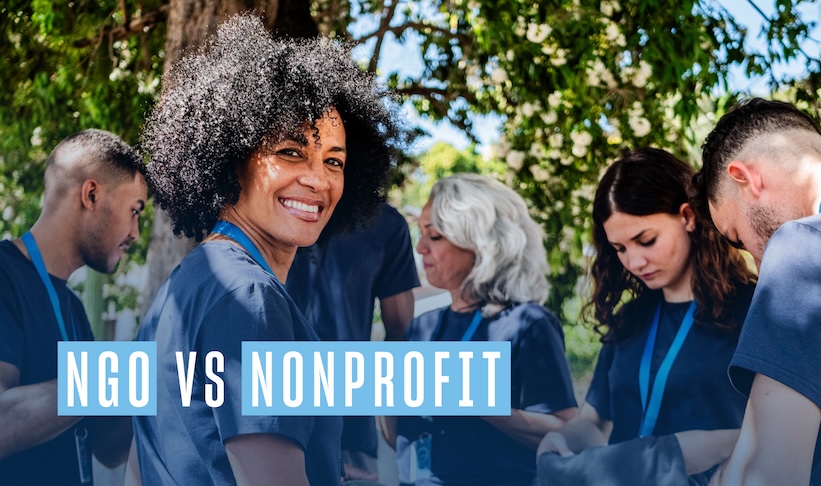You’re looking for something new; a job helping others that also leaves you feeling fulfilled at the end of the day. For mission-driven, passionate individuals, working for a nonprofit can be the perfect fit. Whether you are switching careers or new to the workforce, it’s likely that you’ll be able to find a nonprofit position that draws on your existing experiences, skills and interests. Because nonprofit organizations address a wide range of issues — namely social, environmental and humanitarian — workers of all types are needed.
There is, however, industry-specific training and skill set development that will help you stand out and qualify you for leadership positions if desired. Keep reading for our complete guide on important abilities, employment outlook and what sets the nonprofit sector apart.
What is a Nonprofit
A nonprofit organization, by definition, is one that uses any money earned and puts it back toward the group’s mission. Almost three dozen types of tax-exempt organizations are established in federal tax codes.
Nonprofit efforts span many different industries, including healthcare, education, religion and others that tie into social causes. These organizations are often run by individuals who are passionate about the cause they work for, and value the mission over much else professionally.
For-Profit Sector vs. Nonprofit Sector
The biggest difference between for-profit and nonprofit organizations is how revenue is spent. A business in the for-profit sector will offer customers a good or service in exchange for payment, with the goal of making a profit that can be distributed among shareholders, investors and the like.
On the other hand, nonprofit organizations are mission-focused, with an expressed objective of doing charitable work. Any excess funds earned must be put back into the cause.
Taxation rules also differ by sector. Because nonprofits are working to better society, certain tax benefits are bestowed with proper registration. Working for a nonprofit organization can take many different forms, from museums and theaters to foundations and social service work. The following list includes some of the most common types of nonprofits and their main objectives:
- Culture and arts: Offering enriching experiences through various forms of artistic expression and mediums.
- Education: Providing equal access to education, mostly in underserved communities, and empowering individuals to reach their full potential. This is often achieved by offering programs, scholarships and resources.
- Environment: Working to safeguard the environment and its many inhabitants from harm — now and for years to come. Heavily focused on protecting ecosystems, promoting renewable energy, combating climate change and encouraging responsible use of natural resources
- Foundations: Provide financial support and resources to other nonprofit organizations or causes. They typically have their own endowment or funding source and distribute grants or funds to support specific initiatives, programs or projects aligned with their mission and values.
- Religion: Driven by religious or spiritual missions with community engagement, often in the form of religious worship, spiritual guidance, community service and other outreach as needed.
- Social service: Focused on humanitarian aid and a wide range of services, including disaster relief, health/safety training and general family support.
Pros and Cons of Working for a Nonprofit
Working for a nonprofit is widely regarded as meaningful and fulfilling. Many people find their way to these types of jobs based on personal alignment with an organization’s mission. What keeps them engaged is often a strong sense of community and purpose. Exposure to different cultures, experiences and travel opportunities are seen as added perks. Plus, many nonprofits offer competitive pay and benefits to attract top talent.
However, as with any industry, there are challenges. Rising operating costs and limited staff capacity have proven to be huge hurdles for nonprofits in recent years.
Salary can be another sticking point. Social and community service managers in May of 2021 earned a median annual salary of $74,000 when they had a bachelor’s degree and several years of relevant experience. However, research into Southern California nonprofits found that CEOs with a masters degree earned, on average, $18,000 a year more than their peers who did not have a graduate degree. Specific pay and requirements will vary based on location, position and other factors.
Top Skills Needed to Succeed in Nonprofit Work
Working for a nonprofit requires a combination of hard and soft skills, including the following:
Hard skills are gained through specialized training relevant to your line of work. In the nonprofit sector, highly valued hard skills are:
- Data analysis: Unprecedented access to a variety of data means that it is important to be able to analyze it to identify upcoming trends, make informed decisions and measure your organization’s impact.
- Finance: Understanding financial concepts, budgeting and financial reporting is crucial for managing nonprofit resources effectively. Skills in financial analysis, budget development and bookkeeping are also valuable in ensuring financial sustainability.
- Social media marketing: Nonprofits need to effectively communicate their mission, goals and impact to various stakeholders. Skills in marketing, public relations and social media management are valuable for reaching and engaging your target audience.
- Subject matter expertise: This is in regard to the specific work you will be doing, for example, teaching a language course or collecting vital signs during wellness checks.
Soft skills refer to personal qualities that one possesses. These skills are relatively subjective and cannot be measured like hard skills. Valuable soft skills in nonprofit work include:
- Communication: You must be able to communicate clearly with your fellow nonprofit team members, stakeholders and the people who benefit from your work.
- Critical thinking: There could be instances in which you’re strapped for time and resources. Being willing and able to think critically and creatively is key.
- Curiosity: Be curious about every facet of your work, creating opportunities to learn and grow.
- Empathy: Care about your teammates and those you are working to serve.
- Growth mindset: View challenges and setbacks as opportunities to improve. In the long-run, thinking this way can help you play a role in expanding your nonprofit offerings.
Educational & Professional Experience to Benefit Nonprofit Work
You’ll find that different organizations prefer their employees to have specific education and work experiences, but many top positions require a master’s degree.
With working professionals in mind, USD created a 100% online Master of Science in Nonprofit Leadership and Management program. In 20 months, students sharpen their nonprofit skills with courses designed and taught by leading industry experts.
Strategic leaders are trained not only in the classroom, but in the field. Improve your resume with the addition of internships, volunteer work and passion projects. This level of commitment will show potential employers that you are ready to serve and have put yourself in the best position to meaningfully do so. Check out USD’s guide to evaluate your educational options.




